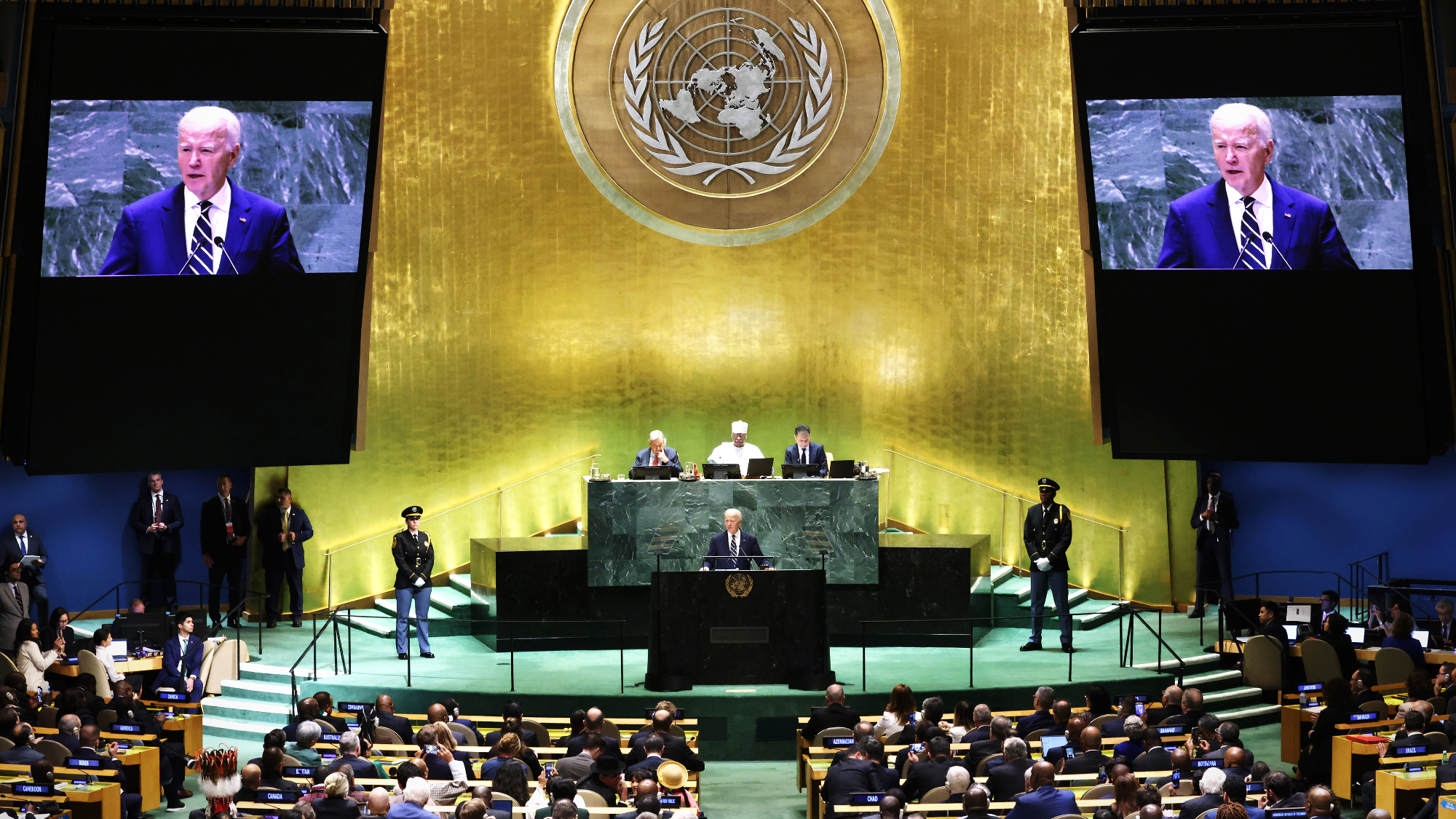Biden gives final UN speech, vows 'things can get better'
President Joe Biden addressed the United Nations General Assembly for the last time


A free daily email with the biggest news stories of the day – and the best features from TheWeek.com
You are now subscribed
Your newsletter sign-up was successful
What happened
President Joe Biden gave a sort of valedictory address at United Nations General Assembly Tuesday, using his final speech before the international body to sift through his four years in the Oval Office and 50 years in global politics for lessons on moving toward a better future.
Who said what
Biden tried to bring a "message of hope for the future" to a General Assembly where "the vibe was pretty grim" amid climate change, poverty and wars in the Middle East, Ukraine and Sudan, The Associated Press said. "Even in the horrors of war, there's a way forward," Biden told the assembled diplomats and world leaders. "Things can get better." His speech "encompassed many of his foreign policy themes throughout his administration," CBS News said, including "rallying the world around Ukraine," managing competition with China and promoting democracy.
Biden urged Israel and Hamas to finally agree to an elusive cease-fire and said a "full-scale war" in Lebanon "is not in anyone's interest." Those seeking "short-term solutions" in the Middle East "were left wanting," CNN said. But Biden earned applause after he pushed an end to the Gaza war and when he used his decision not to seek re-election to encourage a turn from autocracy. "My fellow leaders, let us never forget some things are more important than staying in power," he said. "It's your people that matter the most," and "we are here to serve the people, not the other way around."
What next?
Biden's U.N. speech was the "centerpiece event of a two-day visit to New York" that also includes several one-on-one meetings with other world leaders, Reuters said. The Security Council has scheduled an emergency meeting today to discuss the conflict in Lebanon.
The Week
Escape your echo chamber. Get the facts behind the news, plus analysis from multiple perspectives.

Sign up for The Week's Free Newsletters
From our morning news briefing to a weekly Good News Newsletter, get the best of The Week delivered directly to your inbox.
From our morning news briefing to a weekly Good News Newsletter, get the best of The Week delivered directly to your inbox.
A free daily email with the biggest news stories of the day – and the best features from TheWeek.com
Rafi Schwartz has worked as a politics writer at The Week since 2022, where he covers elections, Congress and the White House. He was previously a contributing writer with Mic focusing largely on politics, a senior writer with Splinter News, a staff writer for Fusion's news lab, and the managing editor of Heeb Magazine, a Jewish life and culture publication. Rafi's work has appeared in Rolling Stone, GOOD and The Forward, among others.
-
 What to know before filing your own taxes for the first time
What to know before filing your own taxes for the first timethe explainer Tackle this financial milestone with confidence
-
 The biggest box office flops of the 21st century
The biggest box office flops of the 21st centuryin depth Unnecessary remakes and turgid, expensive CGI-fests highlight this list of these most notorious box-office losers
-
 The 10 most infamous abductions in modern history
The 10 most infamous abductions in modern historyin depth The taking of Savannah Guthrie’s mother, Nancy, is the latest in a long string of high-profile kidnappings
-
 ‘The mark’s significance is psychological, if that’
‘The mark’s significance is psychological, if that’Instant Opinion Opinion, comment and editorials of the day
-
 Trump links funding to name on Penn Station
Trump links funding to name on Penn StationSpeed Read Trump “can restart the funding with a snap of his fingers,” a Schumer insider said
-
 Trump reclassifies 50,000 federal jobs to ease firings
Trump reclassifies 50,000 federal jobs to ease firingsSpeed Read The rule strips longstanding job protections from federal workers
-
 Supreme Court upholds California gerrymander
Supreme Court upholds California gerrymanderSpeed Read The emergency docket order had no dissents from the court
-
 700 ICE agents exit Twin Cities amid legal chaos
700 ICE agents exit Twin Cities amid legal chaosSpeed Read More than 2,000 agents remain in the region
-
 Is the Gaza peace plan destined to fail?
Is the Gaza peace plan destined to fail?Today’s Big Question Since the ceasefire agreement in October, the situation in Gaza is still ‘precarious’, with the path to peace facing ‘many obstacles’
-
 Trump demands $1B from Harvard, deepening feud
Trump demands $1B from Harvard, deepening feudSpeed Read Trump has continually gone after the university during his second term
-
 House ends brief shutdown, tees up ICE showdown
House ends brief shutdown, tees up ICE showdownSpeed Read Numerous Democrats joined most Republicans in voting yes
